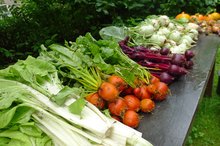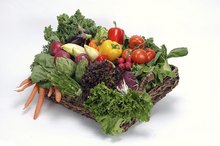Do Vegetables Lose Their Nutrients When Baked?
Baking vegetables breaks down the hard cellular structure, making them tender. Proteins, starches and other complex nutrients are broken down into smaller pieces, making them easier to digest. This breakdown increases the amount of nutrients that can be absorbed by the intestines. Minerals, macronutrients and many vitamins are stable during cooking, but levels of some vitamins may decrease when food is heated. The ideal diet contains cooked and raw vegetables.
Cooking and Nutrients
Although cooking degrades some nutrients, absorption of the remaining nutrients is increased. Your body must break down carbohydrates into sugars, proteins into amino acids and fats into fatty acids to absorb and use them. Minerals are elements that are unchanged by heating. Raw-food advocates claim that cooking destroys important enzymes, or proteins that perform biological reactions. Enzymes in foods are broken down in your body like other proteins and serve no separate use in health. As a result, cooking vegetables does not decrease the effectiveness of enzymes.
- Although cooking degrades some nutrients, absorption of the remaining nutrients is increased.
- Raw-food advocates claim that cooking destroys important enzymes, or proteins that perform biological reactions.
Nutrients in Vegetables
Nutritional Value of Fried Vegetables
Learn More
Generalizing about the nutritional values of vegetables is difficult, because different vegetables have different nutrients and in differing amounts. However, all vegetables are low in fats and calories and are free of cholesterol. Vegetables are important sources of fiber, potassium, folic acid, vitamin A, vitamin E and vitamin C, among others. Vegetables are high in complex carbohydrates and contain low to moderate amounts of protein. To ensure that you are getting the most nutritive value out of your vegetables, eat a variety of them each day.
- Generalizing about the nutritional values of vegetables is difficult, because different vegetables have different nutrients and in differing amounts.
- However, all vegetables are low in fats and calories and are free of cholesterol.
Baking Specifically
Some cooking methods are worse than other for loss of nutrients, although vegetables cooked with any method are nutritious. Boiling can draw nutrients out of foods and into the water used for cooking, for example. In addition, contact with other food may cause unwanted chemical reactions. Frying or sautéing can expose vegetables to high and concentrated heat, which destroys more nutrients. Baking is mostly free of these concerns because it cooks the vegetables more slowly and at a lower temperature.
- Some cooking methods are worse than other for loss of nutrients, although vegetables cooked with any method are nutritious.
- Frying or sautéing can expose vegetables to high and concentrated heat, which destroys more nutrients.
Dietary Recommendations
Do Microwave Ovens Destroy Food Nutrients?
Learn More
The vast majority of Americans do not consume adequate amounts of vegetables. The U.S. Department of Agriculture recommends that adults eat at least 2 to 3 cups of vegetables per day, or four to six servings. Dr. Gabe Mirkin recommends eating a variety of vegetables cooked with a variety of methods. If you are not eating enough vegetables per day, do not be concerned with the cooking method used to prepare them. Instead, focus on eating as many vegetables as you can.
- The vast majority of Americans do not consume adequate amounts of vegetables.
- Instead, focus on eating as many vegetables as you can.
Related Articles
References
- LearningInfo.org: Cooking Does Not Destroy Important Nutrients
- USDA: Why Is it Important to Eat Vegetables?
- Center for Disease Control. Prediabetes—your chance to prevent type 2 diabetes.
- McMacken M, Shah S. A plant-based diet for the prevention and treatment of type 2 diabetes. J Geriatr Cardiol. 2017;14(5):342-354. doi:10.11909/j.issn.1671-5411.2017.05.009
- Olfert MD, Wattick RA. Vegetarian diets and the risk of diabetes. Curr Diab Rep. 2018;18(11):101. doi:10.1007/s11892-018-1070-9
- Zheng J, Sharp S, Imamura F, et al. Association of plasma biomarkers of fruit and vegetable intake with incident type 2 diabetes: EPIC-InterAct case-cohort study in eight European countries. BMJ. 2020 Jul 8;370:m2194. doi:10.1136/bmj.m2194
- Lattimer JM, Haub MD. Effects of dietary fiber and its components on metabolic health. Nutrients. 2010;2(12):1266-1289. doi:10.3390/nu2121266
- The American Institute of Cancer Research. Five steps for cancer safe grilling. Updated June 28, 2018.
Writer Bio
Chris Daniels covers advances in nutrition and fitness online. Daniels has numerous certifications and degrees covering human health, nutritional requirements and sports performance. An avid cyclist, weightlifter and swimmer, Daniels has experienced the journey of fitness in the role of both an athlete and coach.









